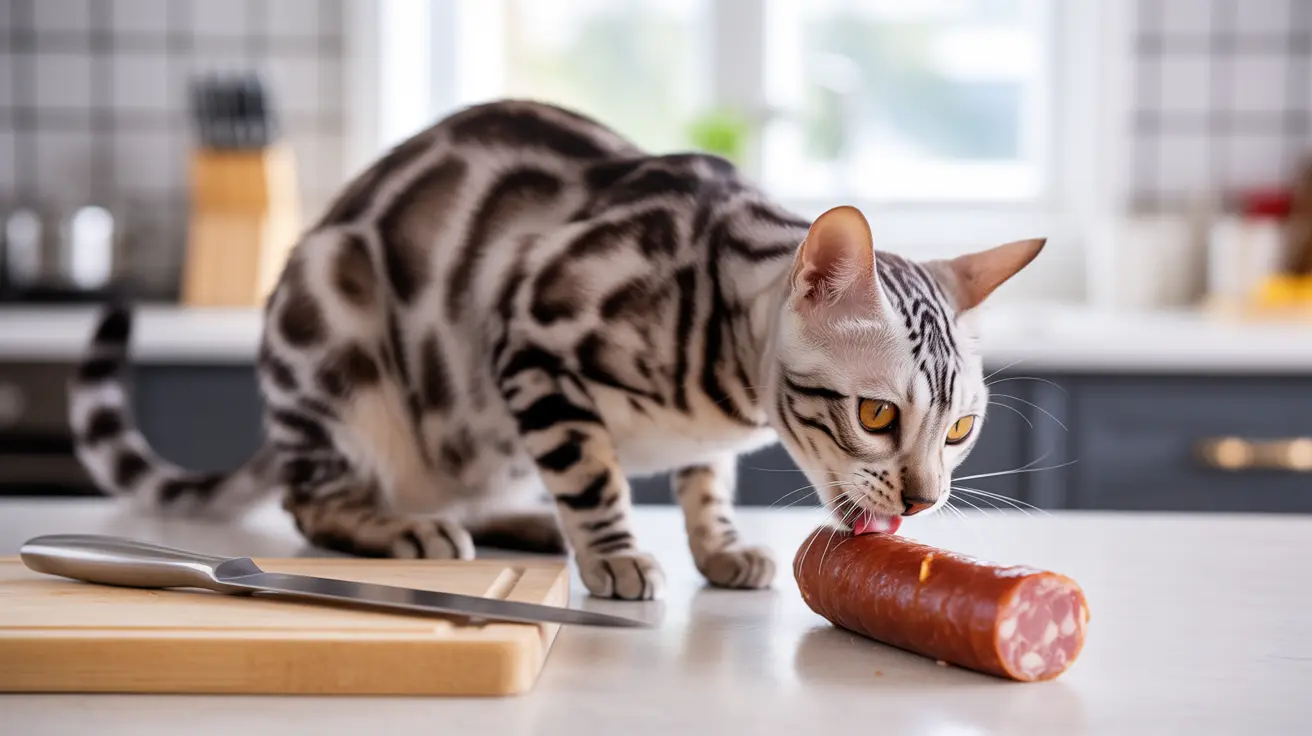As a cat owner, you might wonder if sharing a piece of sausage with your feline friend is safe. While cats are natural carnivores who need meat in their diet, sausage presents several significant health concerns that every pet parent should understand.
In this comprehensive guide, we'll explore why sausage isn't an ideal food choice for cats, what risks it poses, and what safer alternatives you can offer instead. Let's dive into everything you need to know about cats and sausage consumption.
Why Sausage is Problematic for Cats
Despite being meat-based, sausage contains several components that make it unsuitable for feline consumption:
High Fat Content
Most sausages contain excessive amounts of fat, often comprising up to 30% of their caloric content. Cats' diets shouldn't exceed 20% calories from fat, making sausage an unhealthy choice that can lead to obesity and pancreatic issues.
Dangerous Preservatives
Sausages typically contain preservatives like nitrates, nitrites, and sulfites. These additives can be particularly dangerous for cats, as sulfites can cause thiamine (Vitamin B1) deficiency, potentially leading to serious neurological problems.
Harmful Seasonings
Common sausage seasonings like garlic, onion, and various spices are toxic to cats. Even small amounts of these ingredients can cause severe health problems, including damage to red blood cells.
Health Risks of Feeding Sausage to Cats
Immediate Risks
When cats consume sausage, they may experience:
- Digestive upset and vomiting
- Diarrhea
- Dehydration from excess salt
- Lethargy
- Allergic reactions
Long-term Consequences
Regular sausage consumption can lead to:
- Obesity
- Heart disease
- Kidney problems
- Chronic digestive issues
- Thiamine deficiency
- Hypertension
Safe Alternatives to Sausage
Instead of sausage, consider these cat-friendly protein options:
- Plain, cooked chicken breast
- Boiled turkey without seasonings
- Small amounts of cooked fish (without bones)
- Commercial cat treats formulated for feline nutrition
When to Contact Your Veterinarian
If your cat has consumed sausage, watch for these warning signs:
- Persistent vomiting or diarrhea
- Loss of appetite
- Unusual behavior or disorientation
- Lethargy or weakness
- Signs of allergic reaction
Frequently Asked Questions
Can cats safely eat sausage, and if so, under what conditions?
While cats technically can eat tiny amounts of plain, fully cooked sausage occasionally, it's not recommended. If you must offer sausage, ensure it's free from seasonings, preservatives, and contains no toxic ingredients like garlic or onions.
What are the health risks of feeding sausage to cats regularly?
Regular sausage consumption can lead to obesity, heart problems, kidney issues, thiamine deficiency, and digestive disorders. The high fat and salt content, combined with preservatives, makes sausage particularly dangerous for regular consumption.
Which ingredients in sausage are toxic or harmful to cats?
Toxic ingredients commonly found in sausage include garlic, onions, certain spices, and preservatives like sulfites. The high salt and fat content can also be harmful, especially for cats with existing health conditions.
Are there any safer meat treat alternatives to sausage for cats?
Yes, safer alternatives include plain cooked chicken, turkey, or small amounts of fish without seasoning or bones. Always choose lean, unseasoned meats and serve in moderation as occasional treats.
What symptoms should I watch for if my cat accidentally eats sausage?
Monitor your cat for vomiting, diarrhea, lethargy, unusual behavior, loss of appetite, or signs of allergic reaction. If these symptoms occur or persist, contact your veterinarian immediately.
Conclusion
While it might be tempting to share sausage with your cat, the risks far outweigh any potential benefits. Instead, stick to veterinarian-approved treats and a balanced cat food diet to ensure your feline friend's optimal health and well-being.






